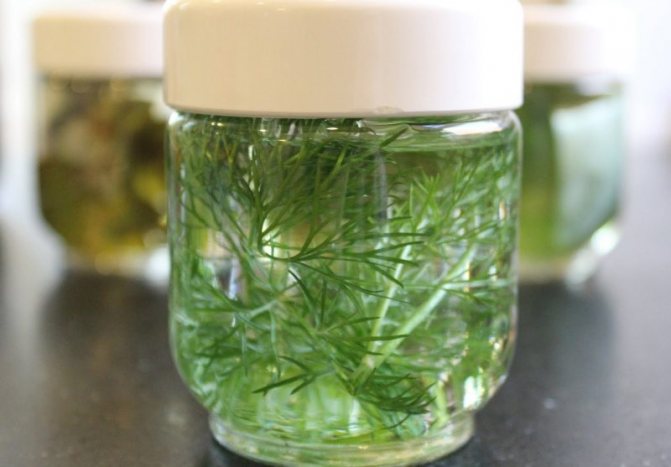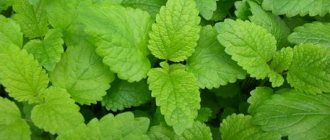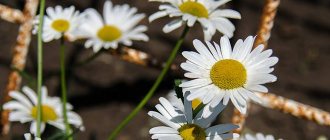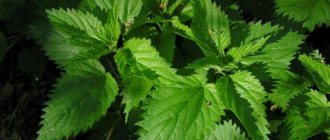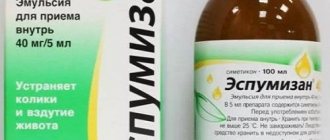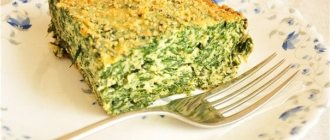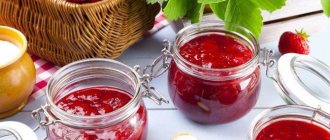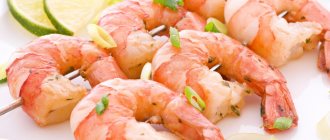People have been growing dill for centuries in European and African countries and, of course, in the plant’s homeland - Asia. Thanks to its spicy and refreshing aroma, as well as its original taste, dill has found wide use in cooking. It is added to salads, as a seasoning for hot and cold dishes and, of course, when preparing marinades.
In addition, the leaves and seeds of the plant containing essential oils are used in medicine. Finally, dill is very popular during breastfeeding. How can it be useful for nursing mothers? Why is it recommended for use by women during lactation, and even by infants? Let's find out.
Composition and properties
All parts of the plant contain useful substances. Let's start with the leaves: they are rich in ascorbic, nicotinic, folic acid, as well as a set of B vitamins, carotene, quercetin and mineral salts (phosphorus, iron, calcium, magnesium and potassium), not to mention fiber. Therefore, fresh dill is recommended to be consumed by a nursing mother as an additional source of vitamins and microelements.
It is worth remembering, however, that green dill, regardless of whether it was bought at the market or picked from your own garden bed, requires careful washing so as not to become infected with helminths and not to have digestive system disorders. Before washing the greens, it is recommended to sort through them and remove parts of the plant in which the process of rotting begins. Another tip: soak the greens in salted water for 15 minutes, and then rinse under running water.
Both the fresh leaves of the plant and the seeds are beneficial.
Dill seeds (or fruits) contain the maximum amount of essential oil, with an aroma somewhat reminiscent of caraway seeds. Taken together, the chemical composition of the plant allows the following beneficial properties to emerge:
- increased appetite;
- improved digestion;
- normalization of metabolism in the body;
- lowering blood pressure.
How can a mother take dill water: four simple recipes
There are many dietary restrictions for women who are breastfeeding. But at the same time - a paradox - the need for vitamins and microelements important for health is increasing. According to our wise grandmothers, the best assistant in this matter for a nursing mother is dill water.
Dill and fennel seeds, from which drinks are prepared, improve lactation, promote the removal of gases from the baby’s unformed intestines, and saturate the mother’s body with useful substances. In addition, you can prepare dill infusion at home without spending a lot of money on expensive pharmaceutical preparations.
Dill during breastfeeding: medicinal properties of the plant
Can mothers who are breastfeeding drink dill infusions? In most cases, the pediatrician will answer that it is possible. Greens and dill seeds are indispensable for women during the postpartum period. In this case, all the “components” of a natural healer are used: fresh dill greens are used to prepare salads, and dill water for lactation is prepared from the seeds.
Dill is a plant that contains the highest concentration of vitamin C. No other fruit from the citrus family can compare with it! Green medicine is also high in vitamin A and beta keratin. The quantity and variety of minerals is not inferior to vitamins. Dill also contains a lot of folic and nicotinic acid, which is necessary for babies.
It is believed that consuming this plant can significantly affect health:
- Blood pressure levels are normalized;
- The heart muscle and blood vessels will be strengthened, so headaches and heart pain will be less likely to bother you;
- Digestion is stabilized and stool is normalized, since dill contains a lot of fiber.
Treatment of cystitis
You can take dill water in the complex treatment of cystitis, as the plant has a powerful diuretic effect. In addition, this inconspicuous-looking herb will help relieve symptoms even with bronchitis, which is very important for nursing mothers, because they cannot take many medications. Dill will disinfect small wounds or cuts and help them heal faster.
Relief from infant colic
Dill will also help children cope with intestinal problems. Indeed, due to the fact that the tiny digestive system has not fully formed, they often suffer from colic.
Mother's breast milk contains very few beneficial substances that spice is rich in. However, they are enough to reduce the number and intensity of manifestations of excessive gas formation in the small intestine.
Treatment of colic with dill and infusions from it is welcomed by doctors. After all, all the components of the medicinal drink are natural.
Some pediatricians advise giving newborns dill water to treat colic. But this is a double-edged sword. Yes, the infusion will help relieve gas. But liquid that is not breast milk can have a bad effect on your baby's digestion.
Ideally, until the age of 6 months, the baby should not eat or drink anything other than breast milk. This is one of the WHO rules for breastfeeding. Of course, except for situations where it is necessary for medical reasons.
Therefore, drinking dill infusion by a nursing mother will be the best solution.
How to make dill water and tea
There are many recipes for delicious and healthy drinks made from fennel seeds and regular dill. Let's look at how to properly use these plants during breastfeeding.
Making dill water at home is very simple. You need a glass bowl into which you add a spoonful of fennel seeds or regular dill.
Pour one glass of boiling water over the seeds, mix well and cover with a lid. For a better effect, you can wrap the container with a towel. Preparing dill water will only take 15 minutes.
After waiting the specified time, the resulting solution is filtered through a fine sieve or gauze.
In the summer, when useful herbs can be found in any garden bed, dill water is prepared from fresh dill. First, the raw materials are prepared: the plant is finely chopped with a knife. Boil 250 ml of water and pour dill into it (a tablespoon of raw material is enough). Cover with a lid and let the water steep for 15 minutes. Prepared dill tea must be strained before use.
For mothers who do not want to spend time preparing homemade infusions, modern pharmaceuticals offer to buy ready-made dill water. However, its main component is not seeds, but fennel oil, so it is considered more effective.
To prepare an infusion that is not inferior in effectiveness to a pharmaceutical product, you can replace fennel seeds with fennel oil when preparing tea. It is sold at the pharmacy.
This tea is prepared in no more than a minute. Considering that the oil has a very high concentration of nutrients, you will need only 2 drops per 1 liter of water.
The oily liquid must be mixed well and used for its intended purpose.
Despite the fact that prepared infusions retain their healing properties for about 30 days, it is better for nursing mothers to prepare a new portion of the drink before each use. Or at least once a day.
Cocktail recipe with dill to improve lactation
All dill recipes are simple and effective. However, if you want to achieve the desired result faster, you can use herbal tea to prepare a drink.
To prepare the cocktail you will need the following seeds:
- Fennel;
- Dill;
- Anise;
- Fenugreek.
The starting ingredients are taken in equal proportions (1 teaspoon each) and thoroughly ground in a coffee grinder. Then the raw materials are placed in a glass container and poured with a glass of boiling water. As in previous recipes, the infusion needs to sit. However, it will take a little more time to get “ready” - up to 30 minutes. All that remains is to strain the healthy cocktail and enjoy the result after using it.
Dill in medicine
So, the composition of this plant makes it useful for medicine and some drugs are produced on its basis.
We recommend reading: Peppermint tea during breastfeeding
This is due to the fact that dill has the following effects:
- antispasmodic;
- soothing;
- carminative;
- diuretic, diaphoretic;
- expectorant;
- hypotensive;
- choleretic.
Thanks to these properties, dill is used in the treatment of gastritis, flatulence, gallbladder and kidney diseases.
In addition, it helps with obesity and cardiovascular problems.
But if we are talking about a nursing mother and her baby, then the benefits of the plant for increasing lactation and relieving cramps cannot be overestimated. However, there is a small nuance here. Which?
Dill during breastfeeding
Dill has been recommended for lactation since ancient times. A small amount of the green parts of the plant was used to season food, and the dill seed was brewed and drunk so that the mother would have a lot of milk. Modern medicine confirms both the medicinal properties and contraindications of dill seeds for women breastfeeding their children.
How dill is beneficial for a woman’s body during lactation:
- stimulates breast milk production;
- when applied externally (compresses, etc.) reduces painful swelling of the mammary glands;
- partially restores the balance of vitamins and other beneficial substances that go into milk.
In addition, dill tea from a nursing mother also has a beneficial effect on the baby: the baby receives substances that normalize digestion through mother’s milk. Brew it like this: pour a tablespoon of dill seeds into a thermos and pour 300 ml of boiling water. This is a daily dose, which should be divided into morning and evening doses, taken for three weeks, then take a break for three days, and repeat if necessary.
In nursing women, dill exhibits its beneficial properties very quickly: babies are less likely to be bothered by colic and have a restful sleep. This is especially important because up to the age of one year, children develop their digestive system, and often babies suffer from intestinal colic, flatulence and other troubles.
Therefore, to the question whether dill can be consumed while breastfeeding, the answer is definitely positive. It is possible and necessary, but in moderation.
In the fight to increase lactation
Many doctors advise brewing and drinking dill while breastfeeding to increase lactation. Experiments were conducted with the participation of lactating women, which allegedly confirmed the effectiveness of dill as a lactogenic agent. However, there is still no reliable information about such plant abilities. How can this be?
Mothers are recommended to drink a glass of warm decoction of dill or fennel seeds before each feeding at the beginning of lactation. In fact, a warm drink can increase your milk flow, even if it's just tea.
Whether dill has any merit in this process is not yet known for certain. However, such a drink certainly does not reduce lactation capacity, relieves intestinal spasms, if any, and is very pleasant to the taste. So why not drink it? This is a worthy alternative to regular teas.
As for increasing lactation, 2 hormones are responsible for it. In order for them to cope well with their task, it is necessary to put the baby to the breast as often as possible, perhaps increase the time they stay with her, and in some cases, express. Well, drink enough fluids throughout the day and immediately before feeding.
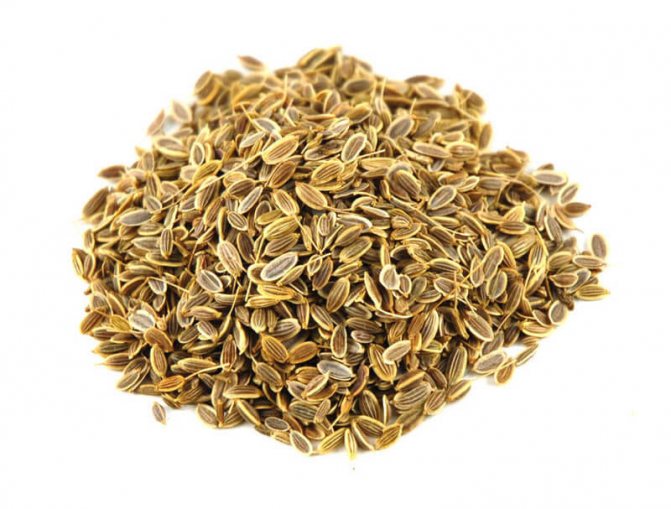
Fennel fruits are more often used to increase lactation and for colic than dill fruits
Preparation of dill water
Answers to questions about how to enhance lactation and how to combat colic in newborns are of interest to many nursing mothers. Traditional medicine is rich in various recipes for preparing dill water.
Both dill seeds and fennel seeds can be used as raw materials for preparing water at home. As noted earlier, fennel seeds have a more pronounced effect, but regular fennel seeds are fine.
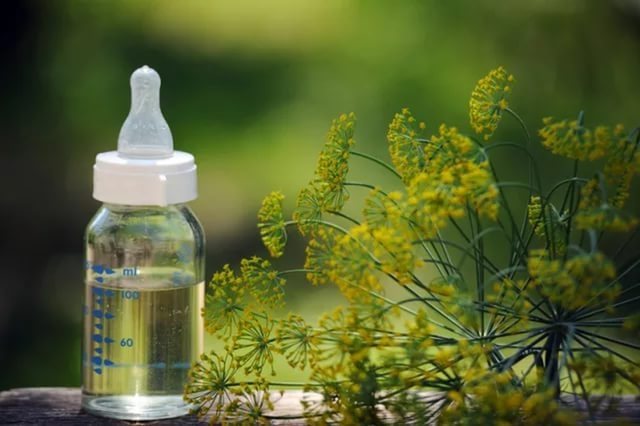
Dill seeds for lactation are also selected taking into account the body’s tolerance of certain substances that make up the plant. It is important to prepare the seeds by first crushing them, since in this case their effectiveness will increase several times.
Dill water can be presented in the form of tea, decoction and infusion.
Each woman decides for herself how to drink dill water for a nursing mother.
Dill tea
Dill tea is prepared as follows:
- 1 tbsp. pour crushed seeds into a glass or mug;
- pour boiling water over the seeds;
- cover the cup with a lid and let it brew for 5-10 minutes;
- Strain the resulting tea and take a small amount (2-3 tbsp) before each feeding.
This tea promotes the flow of breast milk into the mother's mammary glands and has a calming effect.
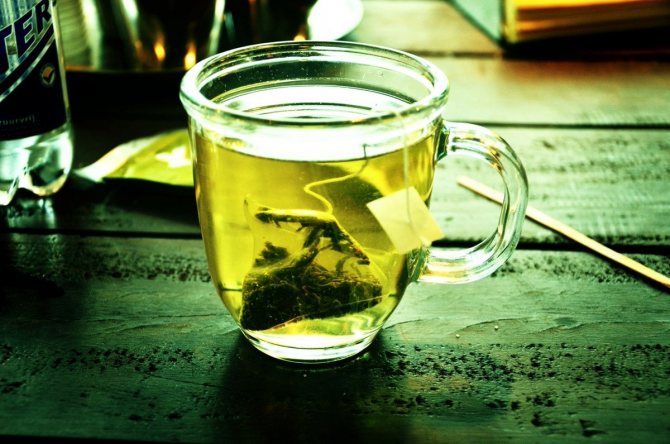
Seed decoction
A decoction of dill seeds is prepared as follows:
- 1-2 tbsp. pour 1 liter of boiled water over the prepared seeds and place on low heat for 5-10 minutes;
- Cool the resulting broth;
- Take before each breastfeeding.
- Dill infusion is prepared according to the following recipe:
- 1 tbsp. pour boiling water (250 ml) over the seeds and place in a warm place for 2 hours;
- Strain the prepared infusion;
- take 2-3 tbsp. 15 minutes before breastfeeding your baby.
Dill water without dill?
The first month of a baby's life is marked by the onset of colic. There are lucky ones who manage to avoid this unpleasant condition, but most children suffer from intestinal spasms. There are quite a few ways to combat colic, but taking dill water remains a time-tested remedy.
Judging by the name, it is logical to assume that it will contain dill. But no! Pharmacy dill tea contains fennel oil in a ratio of 1:1000 to water. This water is given to children with colic, a teaspoon 3 times a day.
Is there a significant difference between fennel and dill? Both plants belong to the Apiaceae family and can easily be grown in the garden. But the qualitative composition of essential oils, as well as their aroma, differs. Dill has a more pronounced diuretic effect, while fennel (popularly called “pharmacy dill”) relieves spasms better and has an expectorant effect. That is, you can use both plants, but fennel is more suitable for treating colic.

Dill water for a nursing mother: how to drink, method of application – Baby
- Dill is a popular spice used in various dishes, bringing great benefits to the human body.
- The plant contains high concentrations of bioactive substances that have a positive effect on the body of a newborn child and a breastfeeding woman.
- Many nursing mothers prefer to take dill water, a natural and effective product, to increase lactation rather than pharmaceuticals.
Show content
What kind of water is this?
Pharmaceutical dill water is an extract of fennel seeds (pharmacy dill) or essential oil of the plant. The solution is sold in glass bottles (volume from 15 to 100 ml). Contains seed extract and distilled water. The main purpose of the drug is to normalize the functioning of the digestive tract.
also buy herbal tea from seeds ground into powder at the pharmacy . The package includes 10 or 30 filter bags.
You can prepare dill water yourself. Fennel or dill seeds are used.
Breastfeeding women are recommended not only to enrich their diet with fresh dill, but also to take dill water. The product brings great benefits to the mother's body :
- supports lactation, stimulates breast milk production;
- removes harmful accumulations from the vascular bed and intestinal tract;
- has a mild laxative and diuretic effect, prevents constipation and swelling;
- promotes weight loss in the postpartum period;
- restores the cyclicity of menstruation;
- relieves excess gas formation and spasmodic pain in the intestines.
Benefits for babies
Dill water is beneficial for the body not only of the nursing mother, but also of the baby.
It not only stimulates lactation, but also enriches breast milk with bioactive substances necessary for the full development of the child’s body.
A baby consuming milk enriched with vitamins and minerals does not experience a deficiency of nutrients and develops correctly and actively.
The water also contains substances that, when introduced into a child’s body, eliminate colic and constipation and normalize the functioning of the infant digestive tract.
Chemical composition
The chemical composition of dill water is almost similar to dill seeds . However, it is better absorbed, so its therapeutic effect is more pronounced. The water contains a large number of bioactive substances that benefit the body of the mother and baby:
- essential oils that have a tonic and carminative effect;
- phytoncides, carotenoids, flavonoids that have an antioxidant effect.
Of the vitamins it should be noted:
- ascorbic acid (C) – 0.3 mg per 100 g of solution (0.3% of the daily intake);
- thiamine (B1) – 6 mcg (0.4%);
- riboflavin (B2) – 4 mcg (0.2%);
- niacin (B3) – 0.04 mg (0.2%);
- pyridoxine (B6) – 4 mcg (0.2%).
The mineral composition is presented:
- potassium – 17 mg per 100 g of drink (0.7% of the daily value);
- calcium – 27 mg (2.7%);
- iron – 0.2 mg (1.4%);
- magnesium – 5 mg (1.2%);
- phosphorus – 4 mg (0.5%);
- zinc – 0.08 mg (0.6%);
- selenium – 0.2 mcg (0.3%);
- manganese – 0.03 mg (1.4%);
- copper – 12 mcg (1.2%).
Indications for use
For breastfeeding women, dill water is indicated as a means for:
- relief from constipation and bloating during the postpartum period;
- normalization of the body's condition after pregnancy;
- stimulating the production and improving the release of breast milk;
- preventing milk stagnation and inflammation of the mammary glands.
The mother can not only drink water herself, but also give it to the baby from the second week of life for:
- removal of gases from the intestines;
- easing pain caused by colic;
- strengthening the child’s immunity;
- easy cleansing of the children's intestinal tract without affecting healthy microflora;
- stimulation of the synthesis of digestive enzymes.
Harm, side effects and allergies
If the drug is used too often, adverse reactions may occur.:
- diarrhea;
- low blood pressure;
- excessive gas formation;
- allergic skin reaction.
With cholelithiasis, there is a high probability of blockage of the biliary tract, resulting in intense pain in the right hypochondrium and attacks of vomiting.
A drink made from fennel seeds has few contraindications. Do not take the product if :
- individual intolerance to dill and fennel;
- cholelithiasis;
- children up to 2 weeks of age.
- urge to vomit;
- diarrhea;
- spasmodic pain in the abdomen.
If these symptoms occur, taking the medicinal drink must be interrupted . After the condition has normalized, drinking water can be resumed, but with strict adherence to the recommended dosage.
How to drink: method of application and dose
Dill seed is a non-allergenic product, so mothers can enrich their diet with the drink from the 10th day after birth without harm to the baby’s body.
The drink is taken daily for 10 days, then there is a 2-week break, after which the course can be repeated. The recommended dosage is a glass 3 times a day, or half a glass 6 times.
You should drink water 30 minutes before breastfeeding your baby.
Recipes with step-by-step instructions
It is not difficult to prepare a dill drink that stimulates lactation and eliminates colic in a baby. The positive effect will be stronger if you prepare and drink fresh water every day. Below are detailed recipes.
For lactation
There are two cooking options:
- Take a tablespoon of seeds, pour a glass of boiling water, stir. Leave the drink to infuse for 15 minutes in a container with a lid. Strain the finished product through cheesecloth or chintz.
- Take a tablespoon of fresh chopped dill and pour 0.5 liters of boiling water. Leave the drink to steep for 20 minutes. Strain before use.
Instead of seeds and greens of the plant, you can use pharmaceutical fennel oil. This is a highly concentrated extract, so when preparing the drink you must carefully follow the dosage of the components so as not to cause harm to the body. Take only 2 drops of oil per liter of water.
In the first months after birth, babies often suffer from colic, because their digestive system is just developing, and enzymes for digesting food are synthesized in insufficient quantities. To improve the condition of their babies, mothers drink dill water .
If the course taken by the mother did not produce an effect, then it is recommended to give the drink to the child.
- For a baby up to a month old, up to 15 drops of the product are dripped onto the tongue 2 – 3 times a day.
- For an older child, add a teaspoon of the drink to a bottle with mother's expressed milk or artificial formula.
The medication continues until the intestinal condition improves.
Fighting excess weight
Many women who have given birth struggle with the extra pounds gained during pregnancy. An effective aid in the fight against excess weight is dill water . It contains few calories (only 4.5 kcal per 100 ml), and contains substances that eliminate constipation and accelerate the burning of fat deposits.
To prepare a weight loss drink, take a tablespoon of seeds and pour a glass of boiling water. The drink is infused for 1.5 hours and filtered. You should drink the product instead of tea between meals.
Where to buy and for how much?
You can purchase dill water by order in pharmacies with a prescription department. You can also buy fennel extract, which you will have to dilute with water yourself according to the included instructions. Mothers also readily buy Plantex dill powder in filter bags from pharmacies for making tea.
- Ready-made water in the prescription department will cost 200–250 rubles.
- The drug "Plantex" (30 sachets) costs 400 - 650 rubles.
- Cost of fennel extract (15 ml):
- in Moscow – 175 – 280 rubles;
- in St. Petersburg – 175 – 230 rubles.
Dill water relieves the baby from colic, helps the mother cope with excess weight, improve lactation, and restore the body after childbirth. The finished product is sold in pharmacies , but many mothers make the product themselves. The recipes are simple; you can use fennel seeds or ordinary dill.
Source:
Dill water
The beneficial qualities of dill for increasing lactation have been known to people for a long time. Mothers who want to ensure sufficient milk production try to use different means.
In such cases, they often forget about accessible and correct methods. Although their effect is most often not inferior to expensive medicines. Many mothers are trying to find out whether a nursing mother can drink dill water.
Let's consider this issue in detail.
Why take dill water?
The diet of young mothers does not always contribute to the proper development of the child’s body and her own body. It is important to follow a diet during the first stages of a baby’s life. To have enough milk, you need to get a lot of nutrients.
There are many prohibitions, but greens and vegetables come to the rescue. In this case, dill is of great benefit. It should be consumed fresh, as additives in various dishes. You can increase the effectiveness of dill's properties if you use it in a drink.
A decoction of the seeds of a plant such as dill is called dill water. These plants are similar in their properties and appearance. Fennel is also called pharmaceutical dill. The drink prepared on their basis tastes the same. These plants are found in many places; their content of beneficial elements is superior to fennel.
Let's figure out why dill water has become common among nursing mothers. The point is the special properties of dill. It contains vitamins B and C, iron, phosphorus, and nicotinic acid.
Dill has a good effect on the digestive system, preventing bloating, constipation and colic. In addition, dill-based water has an antispasmodic effect.
This is very useful, most medications are prohibited for treatment during breastfeeding.
Tip : You can take dill water from the 10th day of a baby’s life.
Only a small part of the beneficial elements from dill penetrates into breast milk. However, even this amount is quite enough for the child to benefit the child’s stomach and intestines. Therefore, if a nursing mother periodically takes this dill water, the baby will have much less colic.
How does dill affect lactation?
Another important property of dill drink is to increase the efficiency of breast milk production. This helps restore lactation after crises. This water enriches the baby's basic nutrition. To achieve the beneficial effects of dill water, you need to remember the following features:
- It is better to drink dill water warm.
- During the day, a nursing mother needs to take a sufficient amount of this drink; it is recommended to take a few sips every couple of hours.
- You should not increase the concentration of the drink when preparing it yourself. You just need to remember to use it.
Where to find dill water
This healthy drink can be purchased at a pharmacy that prepares its own medications. For this drink with dill, only fennel is used.
Its seeds are processed under sterile conditions to form an essential oil, which is mixed with purified water. This product does not last long. But such pharmacies are not available everywhere, and there are few of them.
You can make dill water yourself at home. Instead of fennel, you can use simple dill.
You can prepare dill water in the following ways:
- Take a spoonful of dill seeds into a glass and pour boiling water over it. To obtain a useful product, grains can be crushed. Before drinking this drink, it must be infused for more than 2 hours. This volume should be divided into morning and evening.
- You can add chopped herbs to boiling water and seeds. This enhances its properties. The resulting mixture is kept in a water bath for 15 minutes, and a third of this volume is drunk before meals.
- You can buy fennel oil in pharmacies. It is diluted with water to obtain dill water. For one liter of water, two drops of fennel oil are enough, mix thoroughly. This drink can be stored for no more than a month in the refrigerator.
- At the summer dacha, when dill is available in the garden, you can brew dill tea. A spoonful of chopped dill is poured with boiling water and left to infuse. The resulting drink is filtered and drunk. Pharmacies may sell dill tea in instant form.
Source: https://xn—46-mddb2ckdn.xn--p1ai/zdorove/ukropnaya-voda-dlya-kormyashhej-mamy-kak-pit-sposob-primeneniya.html
Recipes
If you decide to drink dill tea to enhance lactation, then it is best to buy fennel or dill seeds at the pharmacy. In order for the essential oils to be released as much as possible and have the desired effect, before preparing the infusion they can be pounded in a mortar or crushed in a blender, although this is not necessary. You can prepare tea as follows:
Decoction: Pour 1 tablespoon of crushed seeds into a liter of boiling water and simmer for 5 minutes over low heat or in a steam bath. Once the broth has cooled, you can drink it 1-2 tablespoons about 6 times a day before breastfeeding.
Infusion A teaspoon of crushed seeds is poured into a glass of boiling water, after which they are infused for at least 2 hours in a warm place. The tea is filtered and also consumed before feedings, half a glass 3-4 times a day. You can also brew ready-made bagged dill teas purchased at a pharmacy.
Dill water for breastfeeding: benefits, features of preparation and use
Pharmacies sell a lot of products that help stimulate lactation. Various teas, vitamin supplements, and medications can cope with the task, but their cost can be high.
A more affordable option is dill water. This remedy may be useful for a nursing mother.
The main thing is to find out in advance about the features of its preparation, dosage, and duration of use.
Can a nursing mother drink dill water?
The mother of a newborn can safely drink dill water during breastfeeding from the tenth day after birth.
A simple and affordable drink will have a beneficial effect on the body of a woman and her baby. It has a lot of useful properties and has virtually no contraindications.
Beneficial features
Pharmaceutical dill (fennel) and ordinary greens contain vitamins and minerals:
- iron;
- zinc;
- potassium;
- calcium;
- phosphorus;
- carotene;
- folic acid;
- vitamins E, C, B.
The following beneficial properties of the product are highlighted:
- Hypoallergenic. Helps get rid of rashes, itching, eliminates the inflammatory process, promotes rapid healing of wounds.
- Expectorant. When you cough, the airways are cleared and mucus is expelled.
- Diuretic. Used to prevent the development of cystitis or treat it.
- Cleansing. Contains a large amount of fiber, which helps cleanse the intestines and eliminate bloating.
- Immunostimulating. Activates the body's protective functions, helps treat respiratory diseases, and recover after childbirth.
- Eliminate appetite problems. Stimulates the production of gastric juice.
- Normalizes metabolic processes.
- Lowers blood pressure.
- Prevents the development of cardiovascular pathologies.
This drink helps improve lactation, so breastfeeding is a reason to drink it.
Features of choosing ingredients
Pharmacy dill water is made from fennel essential oil. You can prepare a healing decoction at home from the seeds of this plant or use regular dill.
It is allowed to use dill, but the effect will be less pronounced.
It is recommended to purchase raw materials for the drink at a pharmacy or take it from your garden . Both green and dried dill seeds can be used.
Recipes for making water that stimulates lactation
The recipe for lactation is quite simple: 1 tbsp. pour a glass of boiling water over dill seeds, stir, cover with a lid. Brew dill seeds for 15 minutes. After this time, the liquid is filtered through cheesecloth.
You need to drink the prepared broth in small sips about half an hour before feeding. Drink 1 glass of decoction per day, dividing the portion into 2 doses.
Dill water recipe for colic
The first months of a baby’s life are a rather difficult period. The children's digestive system is not yet able to produce enzymes in the required quantities, so gases begin to accumulate in the intestines.
The baby suffers from colic and bloating. There is sleep disturbance, frequent crying, and the baby tightens his legs.
To help the child, the mother needs to drink dill water. Fennel seeds are used: 1 tbsp. The raw materials are crushed, poured with boiling water (200 ml), and left for an hour.
The prepared infusion is filtered.
The method of using the product is that the woman drinks 2 tbsp. liquids before meals. Therapy lasts about three days.
If the desired result was not achieved, the infusion can be given to the baby 2-3 times a day. Single dose – 15 drops on the baby’s tongue. Upon reaching one month of age, 1 tsp. dill water is added to baby formula or expressed milk.
Rules for brewing seeds
In order for the drink to be exclusively beneficial, when brewing seeds you must adhere to certain rules:
- Use purified boiled water.
- Rinse dishes with boiling water.
- Use brightly colored seeds that change the color of the liquid when exposed to high temperatures.
- For 200 ml of water, 1 tbsp is consumed. raw materials. A more saturated concentration is undesirable.
Basic rules of use
A dill-based drink has a large number of beneficial properties, but when drinking it you must adhere to certain rules:
- Drink the infusion warm, but not hot.
- Drink at least 1.5 liters of plain water daily.
- Drink this healing drink regularly.
- Prepare a new infusion each time.
- Monitor yourself and your baby’s reaction: it’s rare, but the product can cause allergies.
Other recipes with dill for breastfeeding
In addition to dill water, other drinks are prepared from dill seeds and herbs, which also have a beneficial effect on the mother’s lactation and the baby’s digestive system.
Tea
Recipe:
- Grind the seeds in a coffee grinder or blender.
- Place the resulting mixture into a cup.
- Pour boiling water into the container in a ratio of 1 tsp. raw materials per glass of liquid.
- Cover the cup and leave for five minutes.
- Strain the finished tea.
You should drink dill tea before each time you put your baby to the breast.
Cocktail
A cocktail of dill, anise, and fennel seeds will help diversify your diet and improve lactation. To prepare it, you need to mix all the ingredients in equal proportions and grind in a coffee grinder. 1 tbsp. pour the resulting mixture with a glass of just boiled water, cover with a lid, leave for half an hour, strain.
Oil solution
To prepare a medicinal solution, you need to dilute 2 drops of fennel oil in 1 liter of water. The product is very concentrated, so a small amount of extract is enough to achieve the desired result.
This liquid should be consumed systematically for a month. Store in the refrigerator for the same time.
Dosage
Regular use of the product is allowed for 1-2 weeks. After this you need to take a break. It is worth ensuring that the dosage is observed: a woman needs to drink 100 ml of the product twice a day.
It is allowed to use the infusion 6 times during the day, but 1 tbsp.
Possible side effects
If you are hypersensitive to dill or fennel, side effects may occur.
Sometimes a baby develops an allergic reaction, manifested by the following symptoms:
- redness of the skin;
- itching;
- hives.
Excessively frequent consumption of the drink can lead to diarrhea and increased gas formation. Possible decrease in blood pressure.
The following negative manifestations may be observed:
- gagging;
- flatulence;
- dizziness;
- prostration;
- swelling of the mucous membranes.
If such symptoms appear, you should stop drinking the drink and seek help from a pediatrician.
Contraindications
Despite the fact that the benefits of dill water are obvious, sometimes its use is contraindicated. The product contains anetine, which helps dilate blood vessels, so it may lower blood pressure.
Nursing mothers suffering from hypotension should avoid using this drug..
Individual intolerance to this product is possible, so it is not recommended to drink infusions and decoctions if you have a food allergy.
The drug is not recommended for pathologies of the gallbladder and liver. This is due to the fact that dill water promotes intensive bile production.
Conclusion
From time immemorial, dill water has proven itself to be an effective, safe and affordable remedy. Therefore, it is used by nursing mothers to increase milk production and eliminate colic in the baby.
The main thing is to prepare the drink strictly according to the rules, observing the dosage. At the same time, it will only be beneficial. Don't forget about contraindications.
Source: https://vseomalishe.ru/sovety-mamam/ukropnaja-voda-dlja-kormjashhej-mamy.html
Precautionary measures
In general, dill or fennel seeds cannot bring any side effects, with the exception of one - lowering blood pressure. The plant contains Anetin, which dilates blood vessels, thereby causing a drop in blood pressure.
Therefore, if a woman is hypotensive, eating fresh dill or drinking an infusion from it should be done with great caution. If weakness, dizziness or nausea occurs, it is necessary to measure blood pressure.
Mothers who have stones in the bile ducts should eat dill with caution. Despite the strong aroma of the plant, allergies and individual intolerances to it are extremely rare.
A little about parsley
Since we are talking about dill, I would like to say a few words about parsley - another type of green that housewives love to add to salads. Can I eat parsley while breastfeeding? Undoubtedly, and even necessary.
It is known that parsley contains almost as much vitamin A as carrots. In addition, it contains a lot of ascorbic and folic acid, vitamin K, potassium, magnesium, iron, B vitamins. Parsley improves immunity, has a beneficial effect on the digestive system and appetite, and has a calming effect. Another plus is that it is low in calories. So be sure to include this vegetable in your diet.
To summarize, I would like to note that many mothers associate the smell of dill with the first months after childbirth, but this is a pleasant time (albeit filled with worries) when you are caring for your baby. We saw that dill, regardless of whether it is taken fresh or as teas and decoctions, is very useful for both mother and child in the first months of life.
Useful properties of dill
First of all, dill is useful for breastfeeding. It reduces the upset of a small tummy and helps normalize the intestines. In addition, it has a calming effect on the baby.
So, a few more useful actions:
- normalization of blood circulation,
- improvement of cardiac function,
- sputum comes out
- the body recovers after damage.
Dill water for lactation is also useful. The substances contained in this plant help increase the amount of milk.
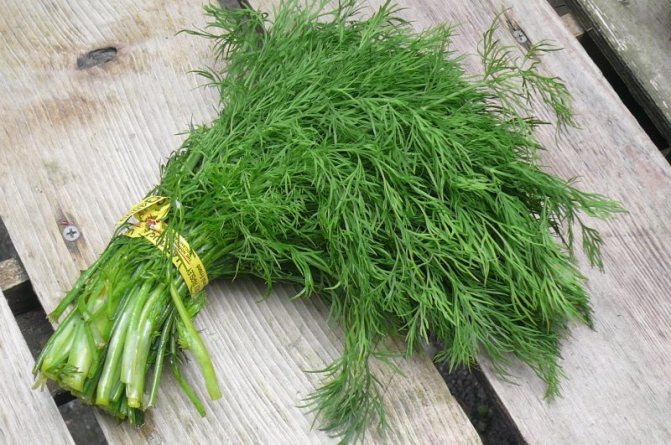
The positive effects of dill do not end there; it also:
- eliminates headaches,
- eliminates heaviness in the stomach,
- helps in the fight against insomnia,
- helps with inflammation (for example, cystitis).
